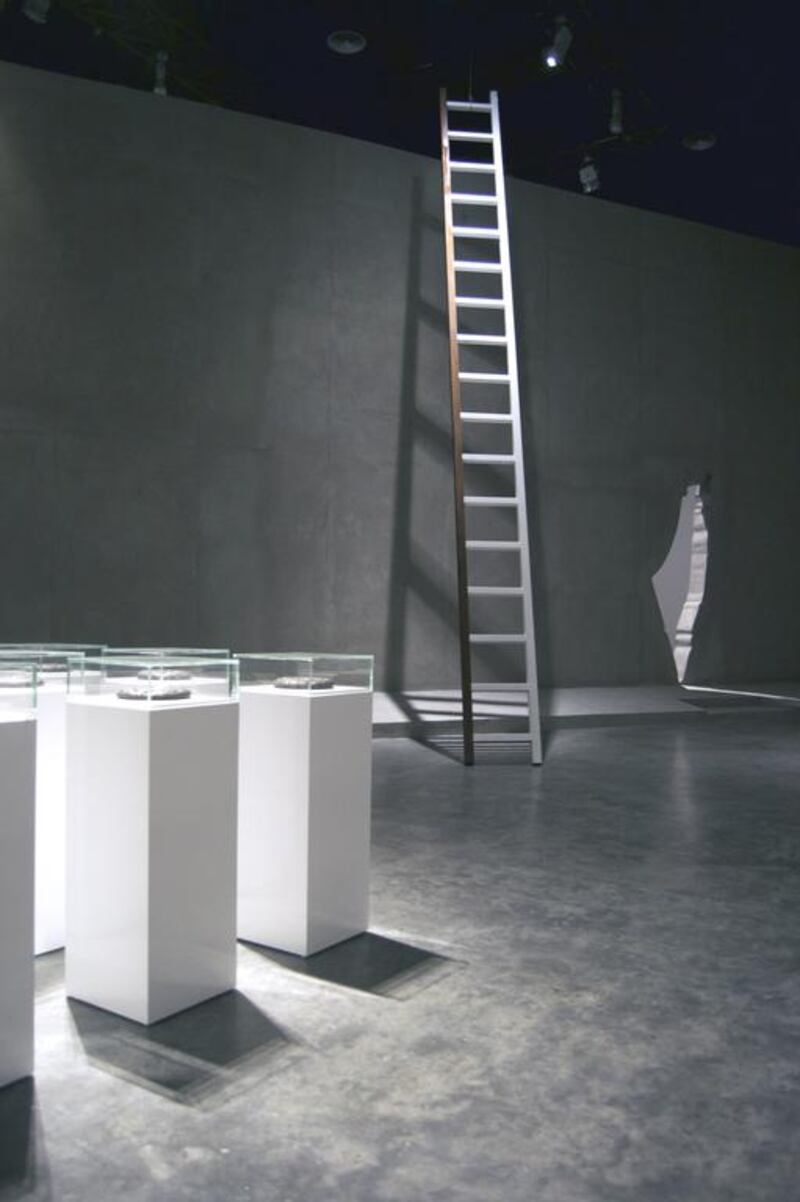On the wall at the entrance to Khaled Jarrar’s exhibition in Dubai’s Ayyam Gallery is a transcript of a conversation between street artist Banksy and an elderly Palestinian man. Recorded when Banksy painted on the West Bank barrier wall in 2005, the old man said the artist’s work made the wall look beautiful. Banksy thanked him but the man replied: “We don’t want it to be beautiful, we hate this wall. Go home.”
This is a fitting introduction to Jarrar’s work. He frequently addresses the subject of the borders, checkpoints, fences and walls that have split communities in his native Palestine.
In several of his previous works, the artist used concrete taken from the wall in Jerusalem as the base material for sculptures.
In his latest exhibition, titled Castles Built From Sand Will Fall, a large wall bisects the gallery space and a ladder appears to lean against it. However, the ladder does not actually touch the wall. It stands alone.
Visitors are invited to walk around the ladder and through a gap in the wall, an opening in the shape of Palestine. It is symbolic because, Jarrar says, while his work very much exists in a literal Palestinian context, he is also keen to broaden the discussion.
“I am more interested in the metaphorical and internal walls that people build with fear, rather than actual physical walls,” he says. “[US president-elect] Donald Trump said he is planning to build a wall to keep Mexicans out of America, calling them dangerous criminals.
“This is dangerous because he is manipulating and controlling people through emotions. This way, before he has even built the real wall, he will have built a barrier inside people’s mentality so that they are living with a state of mind of fear. These kinds of walls are more difficult to break.”
On the other side of Jarrar's wall lies a collection of his works from the past few years. Many of the pieces are videos – one of the most moving is Ka'ak Al Quds, or Bread of Jerusalem. It depicts two boys smuggling loaves of bread through a small hole in one of the separation walls to sell on the other side. The video, which tells a lot about life under Israeli occupation, also provides an example of the innovative entrepreneurship that can be born out of restraint.
“All systems that are constructed have many holes open for exploitation,” says Jarrar.
“People who know the law can get criminals out of jail and or steal money from other people legally. It is playing the system – and that is really what these two boys are doing.”
In another video, Jarrar is seen in Mexico with Culturunners, an organisation that sends artists from the Middle East to North America to undertake projects. He visits Tijuana to see the North American and Mexican border, where he builds an installation that features a free-standing ladder. It is partly made of metal taken from the wall. “This is about power,” he says. “It is us who decides what should be made from the walls that surround us. If we want, we can make them into something positive, a bridge between us.”
Another subtle but important work is made from a pane of glass, on which Jarrar printed an Arabic translation of the phrase “people who live in glass houses shouldn’t throw stones”.
The final part of Jarrar's exhibition is Journey 110, a 2008 video of one of the many tunnels that Palestinians use to cross from the West Bank to East Jerusalem.
While making the 12-minute video, Jarrar spent six hours wading through the sewage-filled tunnel. To get a sense of claustrophobia, the film is shown in a darkened corridor – which hammers home a rather dismal reality of life in Palestine.
“Our earth is collapsing because of the amount of walls we are building and society is not healthy anymore. It is time for us to act,” says Jarrar.
• Castles Built From Sand Will Fall runs until January 7 at Ayyam Gallery, Alserkal Avenue, Dubai. Visit www.ayyamgallery.com for details
aseaman@thenational.ae










